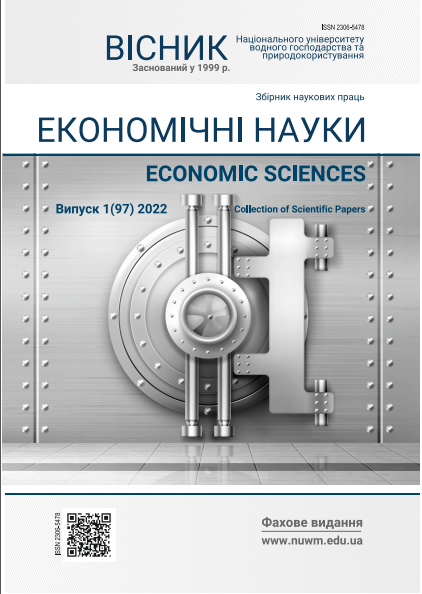DIGITALIZATION – GLOBAL DIMENSIONS OF HUMAN DEVELOPMENT
DOI:
https://doi.org/10.31713/ve120225Keywords:
digitalization, information and communication technologies, artificial intelligence, digital economy, global economy, national economy.Abstract
The digital tendencies of development of national economies from the standpoint of dialectical development of society are characterized. It is determined that digitalization was started exclusively as a tool to improve business - processes for optimization and automation, which allows you to generate additional profits. It is proved that three state approaches dominate in the practical implementation of global digitalization. The first is the change of the social environment through the adaptation of the population to the comfort of receiving digital services (Western developed national economies).The second is totalitarian, where changes are implemented in order to fully control financial flows and maximize their detection of financial flows not controlled by the administrative institution of the state. In these two approaches, such changes are intensified by the banking and financial elite of the world. The formation of the Purpose of the Universe is considered as a separate process of digital globalization. It is noted that this project is a prospect for the development of the latest technologies of the future digital world. The process is proceeding at a rapid pace and China has become the leader, owning almost half of the patents in this field. It is also noted that the communist government of the country managed to completely control theprocess of digitalization under the development of state capitalism through the system of social and digital credit to all citizens. The results of the study can be used for mathematical development of modeling the processes of socio-economic priorities of national economies and their regional and continental groupings, which will focus financial resources on the highest priorities of the country and humanity as a whole.References
Hanna N. K. Enabling Enterprise Transformation: Business and Grassroots Innovation for the Knowledge Economy. New York : Springer, 2011. URL: http://www.amazon.com/Transforming-Government-Building-InformationSociety/dp/1441978453/ref=sr_1_15?ie=UTF8&qid=1288206618&sr=8-15 (data zvernennia: 11.03.2022).
Foster C., & Heeks R. Innovation and Scaling of ICT for the Bottom-of-the-pyramid. Journal of Information Technology. 2013. 28, 296–315.
Giannone D. & Santaniello M. Governance by indicators: the case of the Digital Agenda for Europe. Information Communication and Society. 2018. Pp. 1–14. URL: https://doi.org/10.1080/1369118X.2018.1469655 (data zvernennia: 11.03.2022).
Burger-Helmchen T. & Meghisan-Toma G. M. EU policy for digital society / in A. Dima ed. Doing Business in Europe. Contributions to Management Science. 2018. Cham: Springer. URL: https://doi.org/10.1007/978-3-319-72239-9_9 (data zvernennia: 11.03.2022).
Colin Nicolas, Landier Augustin, Mohnen Pierre et al. The Digital Economy. Notes du conseil danalyse économique. 2015/7 (No 26). P. 1–12. URL: https://www.cairn-int.info/journal-notes-du-conseil-d-analyse-economique-2015-7-page-1.htm (data zvernennia: 11.03.2022).
Nikolina Žajdela Hrustek, Renata Mekovec, Igor Pihir. Developing and Validating Measurement Instrument for Various Aspects of Digital economy. International Journal of E-Services and Mobile Applications. 2019. Vol. 11, pp. 50.
Murali Krishna Penmetsa, Sebastián Bruque-Camara. A framework for building a sustainable digital nation: essential elements and challenges. Digital Policy, Regulation and Governance. 2021. Vol. 23, pp. 262.
A. A. Abdelrehim, A. Khan. Digital Economy Barriers to Trade Regulation Status, Challenges, and Chinas. Response International Journal of Social Sciences Perspectives. 2021. Vol. 8, issue 2. P. 41–49.
Goldmanis, M., Hortaçsu A., Syverson C., & Emre O. Ecommerce and the market structure of retail industries. Econom. J. 2010. 120, 545, 651–682.
Raza M., et al. A digital twin framework for industry 4.0 enabling next-gen manufacturing. In: 2020 9th international conference on industrial technology and management (ICITM). 2020. URL: https://doi.org/10.1109/icitm48982.2020.9080395 (data zvernennia: 11.03.2022).
Su M., & Xia J. The mechanism and path of the digital economy empowering the double circulation. Open Herald. 2020. 6, 71–75.
G20 Financial Inclusion Experts Group ATISG Report, 2010. URL: https://documents1.worldbank.org/curated/en/188451468336589650/pdf/903050WP0REPLACEMENT0Box385358B00PUBLIC0.pdf (data zvernennia: 11.03.2022).
OECD Digital Economy Outlook 2017. Paris : OECD, 2017. P. 22.
Trade and development report. Power, platforms and the free trade delusion. 2018. URL: https://unctad.org/system/files/official-document/tdr2018_en.pdf (data zvernennia: 11.03.2022).
Digital economy report UNCDAT. 2021. URL: https://unctad.org/webflyer/digital-economy-report-2021 (data zvernennia: 11.03.2022).

